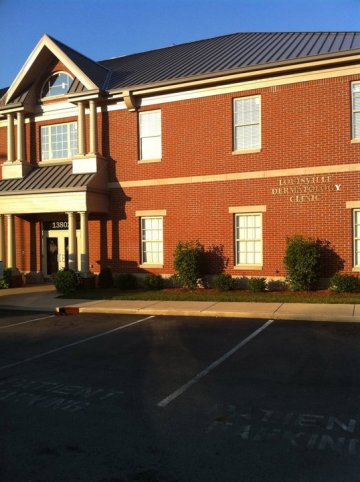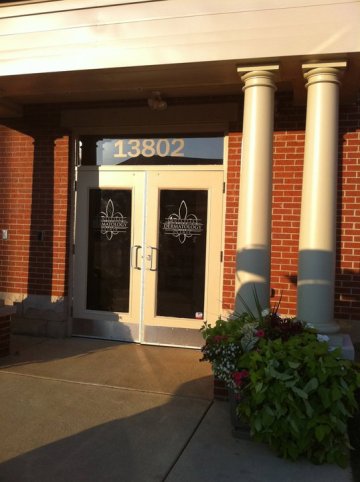Dr. James Wharton - Louisville Dermatology Clinic In Kentucky
/Dr. James Wharton uncovers insights that could lead to better business decisions.

Name: James R. Wharton, MD
Clinic: The Aesthetics Center of Louisville/ Louisville Dermatology Clinic
Location: Louisville, KY
Website: aestheticscenter.org and louisvilledermatology.org
Tell us about your clinic? What treatments do you provide?
We have separated our practice into two clinics. The Louisville Dermatology Clinic is a full service general dermatology practice. We evaluate and treat patients with any skin disease or condition. We treat adult and pediatric patients. We perform surgical procedures such as biopsies, excisions and more complicated cases requiring Mohs micrographic surgery. We have a full dermatopathology lab that can provide analysis and examination of specimens on site.
The Aesthetics Center of Louisville is located in the same building but is a separate practice. We separated our practices for the benefit of our patients. We feel this ethically is the best representation we can provide to our patients. We have a state of the art full service aesthetics practice that offers: peels, microdermabrasion, make-up application, waxing, lash/brow tinting, dermaplaining, IPL, laser hair removal, laser resurfacing, leg vein treatments, various radiofrequency procedures, Ultherapy, tattoo removal, Acleara treatments for acne, MiraDry, injectable toxins, dermal fillers, and concierge VIP dermatology.
You possess active medical licenses in Kentucky, Arkansas, Texas, Hawaii, Missouri, and Florida. Are there any specific distinctions regarding how you can practice medicine on each state?
I have active medical licenses in multiple states. While I currently only practice medicine in Kentucky, it is important that physicians familiarize themselves with all the regulatory requirements for their state. There is a great deal of variation in the laws regarding which procedures can be delegated and the requirements of each state can significantly affect a business and what services they are able to offer.
One term that perfectly describes the way you work:
Multitasker! We have a multidimensional practice. At any one time there are a lot of things to keep track of. We are constantly looking to improve the patient experience and level of care we deliver in both practices as well as evaluating new technologies and services for our patients. I think being good at what we do medically helps us to reach a higher level of service cosmetically yet keeps our practice within the ethical boundaries of what I feel a cosmetic physician should operate.

Apart from handling your practice, you also happen to be a faculty at the University of Louisville School of Medicine. Have you been noticing a transition to utilizing the web and technology for medical education? Do you think technological advances will be able to take the place of conferences? Have you heard of any societies or even organizations that are heading in this direction for their conferences?
We are seeing a shift in web based technology from both the educational and clinical practice perspectives. In this information age, it is essential to utilize any methods for the collection of information that improve clinical practice or can be educational resources for clinicians and patients. Most of the major medical journals now have web based versions. Many web and mobile applications exist as practice or educational resources and I expect that trend only to continue. I don't think we are going to replace standard lecture and didactic learning in the short term but could envision a more web based learning environment in the future as a way to standardize and reduce the costs of medical education.
What have you come to understand in supervising your staff? Have you ever encountered a case of theft or embezzlement or employee fraud? If so, what happened and how was it settled?
Staff management is a full time job; it’s a more of a full time job than practicing medicine. It’s something most physicians are not prepared for when entering the medical field. I have had multiple experiences with theft and embezzlement. Statistically at least half of medical practices will experience some form of theft or fraud and I would say that is an accurate statistic. I think the primary issue is one of not being physically able to oversee every aspect of the management/business operation. You have to trust your employees, but that doesn't mean that you can't verify employees are doing their jobs. We have had issues with theft with money, and products. It’s a complex issue that affects all practices. Ironically, it's often not worth pursuing action because the costs of litigation usually outweigh the crime.
Where do you invest on marketing or advertising?
We certainly do a fair share of print media, but web based marketing is definitely the way things are going. Much of our resources are being devoted to search engine optimization and web based advertising.
What are the most promising areas of research in cosmetic skin care? Are there any areas that look especially promising or that you think are over-hyped? Are there any new therapies that have the potential of displacing existing medical technologies?
One of the more exciting areas of new developments is in body contouring. The market has exploded with new developments of radiofrequency, cryotherapy and other devices for countouring and fat ablation. There are some new developments with mesotherapy that hold promise. Newer techniques may have some benefits over the old technologies and may have patient acceptability issues over some of the more invasive technologies currently available. I think that it’s exciting to see developments that might help to contour an abdomen, neck or jowl line without a surgical intervention.
You're operating an assortment of nonsurgical technologies. How did you end up picking that technology and what did you compare it with? What affected your buying decision and exactly where do nonsurgical technologies complement your practice?
For most of our choices we tend to stay with established manufacturers that have a proven track record of clinical results, support and service. Some products are unique to their category. In those situations you want to do your homework. Talk to vendors, patients and go outside the company contacts and literature to evaluate if that technology offers value to your practice.
How do technology companies sell to you? What technologies do you like? Which do you dislike and why? Are there any technologies that you would advise physicians to avoid, either for medical or business reasons?
Electronic medical records are the biggest thing that is being marketed and over-marketed. I have concerns over the loss of productivity, the redundant and often enormous amounts of useless medical records that are generated, and also the difficulty staff have keeping up with scanning and inputting data into those systems. I don’t think we are quite ready for that transition yet. I think our governmental and private insurers are pushing us that way, but if possible, in dermatology or an aesthetics practice, I think it best to wait to adopt those technologies until one absolutely has to. I think most of the technologies are overpriced and underdeliver and you end up locking yourself into an expensive venture that is hard to revert from.

Where do you want your company to be in five or ten years?
We would like to be ideally independent from contractual relationships with third party payers whether it’s the government or private insurance companies. I think that would be the ultimate practice, whether we will get there remains to be unseen.
We are trying to develop a model or marketing called VIP dermatology, an a la carte practice for dermatology to deliver care that we think will be more competitive, cost effective and that is more efficient than current business models.
What's the best advice you've ever received as a physician and as an entrepreneur?
There are several things that come to mind. I think the advice of hiring great staff makes or breaks you; it’s worth paying for good staff. To associate yourself with exceptional business advisors; accountants, financial advisors and attorneys that know your business and can help you make smart decisions is crucial. Assume nothing and always check and verify constantly. Your business is never static it’s always in a state of motion and turnover. Understand that it takes constant input and reevaluation.
About: Dr. Wharton earned his undergraduate degree from Duke University in 1990. He graduated from the University of South Carolina School of Medicine in 1994. His residency in dermatology was completed at the University of Arkansas for Medical Sciences. After finishing his training, he entered into private practice in Northwest Arkansas where he practiced for 9 years prior to moving to Louisville, Kentucky. While in private practice Dr. Wharton finished specialized training in dermatopathology and was on the faculty at the University of Arkansas in the Department of Dermatology. He is board certified in both Dermatology and Dermatopathology and is currently on the faculty at the University of Louisville School of Medicine. Dr. Wharton is a member of the American Academy of Dermatology, the American Society for Mohs Surgery, the American Society of Dermatopathology, the International Society of Dermatopathology and multiple other organizations Dr. Wharton holds active medical licenses in Kentucky, Arkansas, Texas, Hawaii, Missouri, and Florida.
This interview is part of a series of interviews of physicians running medical spas, laser clinics and cosmetic surgery centers. If you'd like to be interviewed, just contact us.





